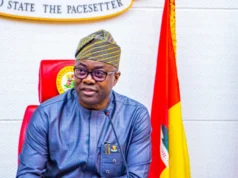Kazeem Kolawole Raji, a chieftain of the All Progressives Congress, APC, in Oyo State has said that empowerment to be given to youth should be information and communication technology, ICT, driven.
K.K Raji, as he is fondly called, made this known when he chaired the 16th biennial national conference of the School of Secondary Education (Arts and Social Sciences Programmes ) holding at the Federal College of Education (Special), Oyo.
Themed Humanities in the face of multi-faceted challenges in Nigeria: Implications for engagement and survival, Raji, who is aspiring to represent Oyo central senatorial district in the 2023 election, explained that “youth empowerment is the usual slogan in the mouth of contemporary political leaders and well-meaning stakeholders and citizens. The clamor for youth empowerment is intensified considering the global economic meltdown and the ravaging economic recession biting hard on developing countries, especially Nigeria and other African countries. The mass retrenchment of workers by multi-national companies, private and public sectors, and supposedly non-existent or perhaps, inadequate white-collar jobs make youth empowerment more needed now than ever. Youth empowerment is indeed the way to go. But such empowerment has to be Information and Communication Technology (ICT) driven.
“It is a truism that youths are leaders of tomorrow. Yet, more self-evident truth that leadership is a mirage to an un-empowered youth. Resources to genuine and enduring leadership accrue from meaningful youth empowerment; empowerment that is ICT compliant.
“As you are undoubtedly aware, Technology, particularly ICT, is the critical driver of the knowledge-based economy of our post-modern world. As many notable pundits predicted in the course of the 20th Century, emphasis and global relevance in today’s 21st Century world, has shifted from nations with huge natural resources to nations with developed human resources that can technologically explore, exploit and manage natural resources for the benefit of mankind.”
Raji was later presented an award.
See the full lecture:
It gives me great pleasure to welcome you all to the 16th Biennial National Conference of the School of Secondary Education (Arts and Social Sciences Programmes).
I must admit very succinctly, that it is a thing of joy for me to be invited as the Chairman of thisConference but most importantly, I am immensely grateful to the organizers of this Conference tagged “Humanities in the face of Multi-faceted Challenges in Nigeria: Implications for Engagement and Survival”. I am also very thankful to the School Management, who are renowned as much for their wits as for their time honored commitment to inclusive and progressive development of their students and the school. There is no better time than now for this conference.
Consequently, the topic of the conference “Humanities in the face of Multi–faceted Challenges in Nigeria: Implications for Engagement and Survival” will pave way for global and holistic view of the myriads of challenges confronting our nation. As implied by the topic, these challenges are limitless, to mention but a few, we have: Human Development Challenges, Leadership Challenges; Governance Challenges; Corruption Challenges; Infrastructural and Institutional Challenges; Macroeconomic Challenges;Lack of Technological Capabilities; Market Challenges; Political Parties without Ideologies; Disrespect for the Rule of Law etc.
The stated obvious, in my considered opinion has informed the efforts of the academics and intellectuals here, to birth this topical issue for dissection and discourse with a view to bequeathing “a solution driven trajectories” for combating multi–faceted challenges be–deviling Nigeria and humanity at large.
Permit me to be biased because of my training and career and harp briefly on Lack of Technological Capabilities. Unemployment has been soaring in Nigeria and the rate will continue to ratchet upward without technological capability to drive the economy and create employment opportunities. Because of lack of investment in technology education, Nigeria is suffering from a shortage of skilled technical manpower to build and maintain its critical infrastructure and produce quality goods and services. Development economists have noted that socioeconomic changes are impossible in any society without the technological preconditions and with technological capability and good governance national development is possible. In fact, history shows that no nation has developed without “technological capability”.
Youth empowerment is the usual slogan in the mouth of contemporary political leaders and well-meaning stakeholders and citizens. The clamor for youth empowerment is intensified considering the global economic meltdown and the ravaging economic recession biting hard on developing countries, especially Nigeria and other African countries. The mass retrenchment of workers by multi-national companies, private and public sectors, and supposedly non–existent or perhaps, inadequate white-collar jobs make youth empowerment more needed now than ever. Youth empowerment is indeed the way to go. But such empowerment has to be Information and Communication Technology (ICT) driven.
It is a truism that youths are leaders of tomorrow. Yet, more self-evident truth that leadership is a mirage to an un-empowered youth. Resources to genuine and enduring leadership accrue from meaningful youth empowerment; empowerment that is ICT compliant.
As you are undoubtedly aware, Technology, particularly ICT, is the critical driver of the knowledge-based economy of our post-modern world. As many notable pundits predicted in the course of the 20thCentury, emphasis and global relevance in today’s 21stCentury world, has shifted from nations with huge natural resources to nations with developed human resources that can technologically explore, exploit and manage natural resources for the benefit of mankind.
This reality of global relevance is now impacting unavoidably on our collective national psyche in Nigeria today with the situation of ever-dwindling international oil prices and, by extension, ever-dwindling national revenue generation and foreignreserves. In today’s global village, the frontier-knowledge elites, the elites of the technological and the digital revolutions, are the undisputable custodians of strategic and economic power.
Today, our post-colonial national revenue generation model of an oil-export-only economy has been clearly shown to be unsustainable in the 21stCentury. The obvious solution, as experts have pointed out is to diversify the productive base of our national economy and urgently train and re-train our national workforce technologically and digitally for self-sustenance. There is a need for a strong focus on developing the ICT local content initiatives and the innovation ecosystem across the Country.
However, because of the poor employment opportunities in Nigeria emanating partly from lack of technological capability, most of the youth are frustrated and desperate to leave the country. Stories abound of how desperate Nigerians, mostly youth, take extraordinary risks to travel to Europe, the United States and even to some African nations in search of an elusive better life. Some of them have been arrested, tortured, and maimed or imprisoned in foreign countries; and some of them have died in the deserts of North Africa in the process of trying to escape economic hardship. Those who survive the ordeal will live to recount their bitter memories; however, those who lack the will or resources to leave may engage in various types of anti-social activities including kidnapping for ransom, banditry and armed robbery, etc.
To address the challenges enumerated above, Nigeria needs a leader who has progressive social values that can effectively adopt monetary and fiscal policies to stimulate the economy, tame bribery and corruption, nepotism and tribalism that are clogs in the wheel of national development. Nigeria could become an economic power-house and command the attention of the international community only if it can give proper attention to education, particularly science and technology education and produce quality goods and services at least costs. This will enable Nigeria to compete effectively in the global market. Nigeria must learn to reward hard work and creativity, without which the economy will continue to shrink. The people have a critical role to play in meeting these challenges. They should become politically educated and remain vigilant to make the leaders listen and act rightly.
As a firm believer in the global leadership destiny of Nigeria, the apex of African humanity, I hold that the Nigerian genius that has hitherto been wrongly noted for underhand innovations is highly capable of positive existential innovations given the right environment. The time has come for Nigeria, as a member of the MINT Bloc, to deliver innovative products and services to the world and therewith assert itself on the world stage alongside the Western and the BRIC nations presently leading our world.
Distinguished Ladies and Gentlemen, as I round-off my keynote address, I wish to invite you to please put on your thinking caps and challenge Nigeria’s actual and potential employment problems with out-of-the-box thinking during the course of this conference. I strongly believe that we can achieve our dream of making Nigeria great and make it the leading light in the comity of Nations. We only need to strategically harvest available human capital and innovative ideas. With what I have seen here today, we shall succeed on this new journey.
Let me re-echo the words of Vigdis Finnbogadottir, Chairperson of the UNESCO organized INFO-ethics 2000: “We do not want our children to be info-poor or info-deprived, we surely want them to be info-rich……., in a word, we want them to be info-empowered”.
It is my hope that, based on in-depth deliberations’ by the scholars here, you will reach common knowledge grounds and breakthroughs that will lead to a further strengthening of developmental discussions in humanities and beyond.
I will like to end by expressing my best wishes for a more rewarding conference and I await recommendations with much interest, since I am sure they will contribute greatly to your most appreciated global efforts to nip challenges confronting our nation in the bud.
I wholeheartedly welcome you all to this summit with deep pleasure.
Thank you for your attention and I wish you fruitful deliberations.
God bless you all.




































